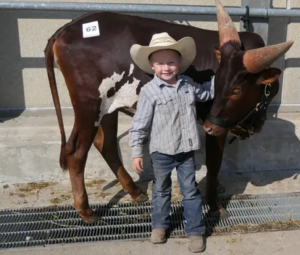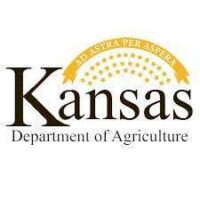Raising Watusi cattle is just like raising any other cattle, said Blake Edwards, who owns Red Hill Watusi Ranch in Fairview, Okla. Edwards brought 20 head of cattle to the Watusi Show on Saturday at the Kansas State Fair.
Edwards, who serves as president of the World Watusi Association, brought along his five-year-old son, McCoy, to help him show one of his calves. McCoy said he likes helping his father take care of the animals, calling them “cool.”
A handful of competitors showed up for the Watusi Show, but they brought dozens of animals — from calf to bull. 
“Most of (the Watusi) are pretty sweet, but when they have a calf, they can get pretty defensive,” said Jevin Base, 17, who helps his grandfather Vernon Base of Newton, one of the directors of the World Watusi Association, with his cattle. “They’re pretty unique animals.”
Kaelynn Garcia, 10, of Hutchinson came to the show with her parents and siblings. Growing up in the city, she said she had never seen anything like these animals before. “I like their horns,” Kaelynn said. The horns are what makes this bovine unique.
“I look at the horn quality, the size and the shape,” said Brian Habjan of Linwood, the judge of the Watusi Show. “This is a pretty good sized show.”
Along with the animal’s horns, Habjan examines their structure. But when judging, he always mentions the horns, saying a female calf was “off to a nice start with her set of horns.” Habjan said he loves judging any animals.
“I love looking at livestock,” he said. “It’s always nice to see what people are raising.”
The World Watusi Association is a non-profit organization dedicated to the preservation, education and upbreeding of Watusi-Ankole cattle. According to the association, Watusi are one of the oldest breeds of cattle in the world, dating back more than 5,000 years to the African continent. The World Watusi Association maintains breed standards, including how to measure horns, stud books and a registry.
The cattle’s horns can grow to more than six feet, but the width also matters. According to River Oaks Cattle’s website, the wider the spread, the more valuable the animal. Like many who raise this animal, the World Watusi Association wants to continue to educate and support the growth of this breed. As reported in The Hutchinson News.




